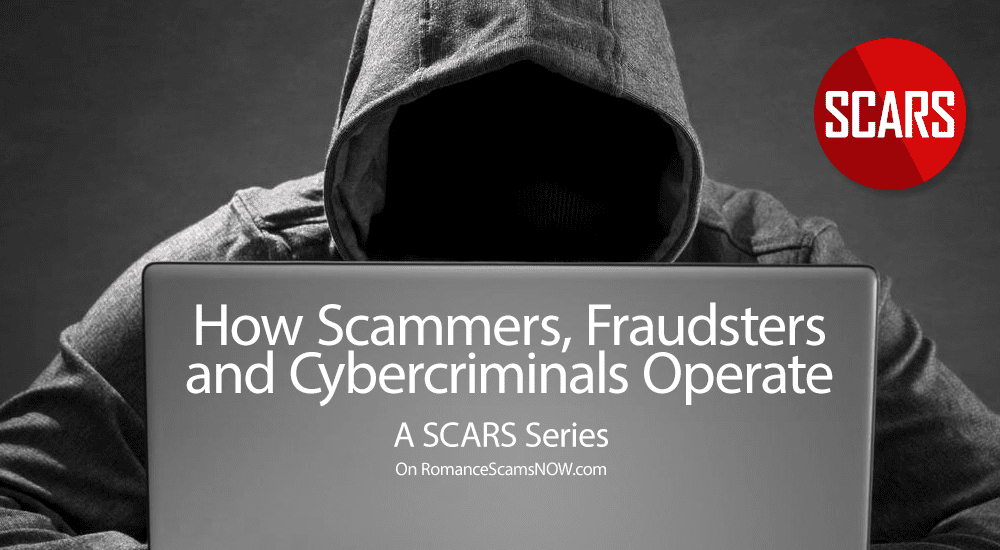
SCARS Institute’s Encyclopedia of Scams™ Published Continuously for 25 Years

Social Delivery Is A Scammer Grooming Technique
In the realm of online romance fraud or relationship scams, scammers employ a calculated technique known as “social delivery” to establish rapport and cultivate trust with their unsuspecting victims.
Social Delivery
Through this deceptive method, fraudsters go beyond mere virtual interactions and take their manipulation to a tangible level by sending packages filled with various enticing items. These packages often include charming tokens of their affection and commitment such as: teddy bears, watches, air pods, and even unexpected treats like pizza, drinks, and vibrant bouquets of flowers.
The term “social delivery” aptly captures this specific step in the progression of their grooming process, where the physical act of sending these gifts becomes a crucial tool for their fraudulent agenda.
Once the package is dispatched, the fraudsters cunningly request that the recipients take a photograph of themselves, in the presence of the delivered package, as a means to ensure its arrival. This seemingly innocent request plays a pivotal role in advancing the scam. By engaging the victims in this way, the scammers cleverly exploit their victim’s emotions, leveraging the excitement and gratitude elicited by the unexpected gift.
This visual confirmation serves a dual purpose for the criminals. On one hand, it provides them with tangible proof that their social delivery tactic has been successful, reinforcing their ability to deceive and manipulate their victims. On the other hand, it compels the victims to actively participate in the fake relationship, inadvertently deepening their engagement and susceptibility to further exploitation.
Within the intricate web of online forums and communication platforms where fraudsters gather, the concept of social delivery takes on a new dimension.
It becomes a shared language, a term familiar among these criminals who proudly display their ill-gotten achievements. On these virtual spaces, the fraudsters proudly showcase the images and stories of the packages they have sent, and more significantly, the victims captured in photographs alongside their delivered gifts. These uploads serve not only as a means of personal gratification for this class of fraudsters but also as a form of communication and validation within their nefarious community. It is a chilling display of their manipulative skills, a method to exchange tips, tactics, and celebrate their exploitative successes.
Why Engage In Social Delivery?
Scammers may sometimes send gifts and presents to their victims as a tactic to further manipulate and exploit them.
Here are a few reasons why scammers engage in such behavior:
- Establishing trust: By sending gifts, scammers aim to create a sense of trust and goodwill with their victims. The act of receiving a gift can evoke positive emotions and make victims more inclined to believe the scammer’s intentions are genuine.
- Reciprocity: Scammers exploit the principle of reciprocity, which is a social norm where people feel obliged to reciprocate when someone does something nice for them. By sending a gift, scammers hope that victims will feel obligated to reciprocate in some way, such as by providing personal information or sending money.
- Psychological manipulation: Scammers understand that emotions play a crucial role in their success. Sending gifts can trigger feelings of gratitude, guilt, or indebtedness in victims, making them more vulnerable to the scammer’s subsequent requests or demands. Scammers often employ various psychological manipulation tactics to exploit their victims. Sending gifts is part of a broader strategy that includes creating a false sense of urgency, exploiting vulnerabilities, and manipulating emotions such as fear, greed, or desperation. The goal is to cloud victims’ judgment and make them more susceptible to falling for the scam.
- Building a relationship: Scammers often adopt personas and pretend to be someone trustworthy or romantically interested. Sending gifts can be a part of the scammer’s strategy to build a deeper emotional connection with the victim, leading to a more prolonged and successful scam.
- Legitimacy and credibility: Some scammers may send counterfeit items or fake checks as gifts to create an illusion of legitimacy. By presenting themselves as generous and reliable, they attempt to establish credibility and convince victims that their subsequent requests or investment opportunities are legitimate. Scammers understand that trust is a crucial factor in successful scams. By sending gifts, they aim to reinforce the perception that they are legitimate and trustworthy. Victims may interpret the gifts as evidence that the scammer is genuinely invested in their well-being, further solidifying the false trust.
- Overcoming skepticism: Scammers are aware that people can be skeptical when approached with fraudulent schemes. By sending gifts, they aim to disarm victims’ initial skepticism and make them more receptive to their subsequent requests. Victims may lower their guard, assuming that if the scammer is sending gifts, they must have good intentions.
- Encouraging continued engagement: Sending gifts can be a way for scammers to keep victims engaged in the scam. By receiving a gift, victims may feel more invested in the relationship or the promised benefits associated with the scam. Scammers exploit this emotional investment to prolong the interaction, increasing the likelihood of further monetary or personal information exploitation.
- Psychological impact: Receiving unexpected gifts can have a psychological impact on individuals. It can create a sense of surprise, excitement, and curiosity, which scammers leverage to maintain control over their victims. Victims may become curious about the motives behind the gifts or feel compelled to continue interacting with the scammer out of curiosity or a desire for more gifts.
In effect, the act of receiving gifts is another form of an Amygdala Hijack to produce additional hormones and neurotransmitters in the brain.
Gallery of Social Delivery
How Do Scammers Pay For Social Delivery?
Scammers have various methods for paying for the items they purchase as part of the “social delivery” technique.
You may remember that scammers involved in Romance Scams often have a “child” and ask that you buy a gift for them? Many many victims do just that, and this is where those gifts often go – to other victims!
Here are a few other common ways that criminals pay for these gifts:
- Stolen credit cards: Scammers often obtain stolen credit card information through illegal means. They may purchase items using these stolen credit cards, allowing them to pay for the gifts without their own funds being involved. This allows them to maintain anonymity and distance themselves from any financial transactions associated with the scam.
- Compromised accounts: Scammers may gain unauthorized access to legitimate accounts, such as online shopping accounts or payment platforms. By using these compromised accounts, they can make purchases without leaving a direct trace back to themselves. This method can involve using stolen login credentials or employing techniques like phishing to trick victims into revealing their account information. Or they can easily be purchased on the dark web.
- Money mules: Scammers may enlist the help of unwitting individuals known as money mules. These individuals are often recruited under false pretenses or are actual scam victims themselves, believing they are participating in legitimate business transactions. The scammers use the money mules’ bank accounts to receive funds from their fraudulent activities, including purchasing items for social delivery. The money mules are then instructed to transfer the funds to the scammers or make purchases on their behalf.
- Fake or fraudulent payment methods: Scammers may create fake payment methods or use fraudulent techniques to deceive sellers. For example, they may provide counterfeit checks, fabricated payment confirmation emails, or use stolen or fake financial account information. By tricking sellers into believing they have received payment, scammers can acquire the items for social delivery without actually paying for them.
- Money laundering: In some cases, scammers may use money laundering techniques to facilitate the payment for the items. They may utilize complex networks of transactions and transfers to obscure the origin of the funds and make it difficult to trace the money back to its illicit source. This method allows scammers to disguise their activities and use the proceeds of their scams to purchase gifts for social delivery.
It is important to note that all these methods involve illegal activities, and criminals are constantly evolving their tactics to stay one step ahead. To combat such fraudulent activities, it is essential for individuals and businesses to remain vigilant, exercise caution when conducting online transactions, and report any suspicious or fraudulent behavior to the appropriate authorities.
Victim Warning
In almost all cases, the items received by a victim are actually stolen property.
It is important to make sure that you itemize anything they receive when making a police report or they could be subject to a criminal charge of receiving stolen property by the original owner. This is especially true if the items were purchased using stolen credit cards – the merchant will have only the victim to go after.
Be Aware
In light of these devious practices, it is crucial for individuals to remain vigilant and cautious when engaging in online relationships, especially when confronted with unexpected gifts from virtual acquaintances. Awareness of the social delivery tactic empowers potential victims to recognize the calculated manipulation behind these gestures. It serves as a reminder that sincerity and trust should not be solely based on material tokens but rather on genuine connections built over time, in which personal interactions and consistent behavior play a crucial role. By staying informed and cautious, individuals can safeguard themselves against falling victim to the intricate traps set by online romance fraudsters utilizing the tactic of social delivery.
-/ 30 /-
What do you think about this?
Please share your thoughts in a comment below!
LEAVE A COMMENT?
Thank you for your comment. You may receive an email to follow up. We never share your data with marketers.
Recent Comments
On Other Articles
- on Love Bombing And How Romance Scam Victims Are Forced To Feel: “I was love bombed to the point that I would do just about anything for the scammer(s). I was told…” Feb 11, 14:24
- on Dani Daniels (Kira Lee Orsag): Another Scammer’s Favorite: “You provide a valuable service! I wish more people knew about it!” Feb 10, 15:05
- on Danielle Delaunay/Danielle Genevieve – Stolen Identity/Stolen Photos – Impersonation Victim UPDATED 2024: “We highly recommend that you simply turn away form the scam and scammers, and focus on the development of a…” Feb 4, 19:47
- on The Art Of Deception: The Fundamental Principals Of Successful Deceptions – 2024: “I experienced many of the deceptive tactics that romance scammers use. I was told various stories of hardship and why…” Feb 4, 15:27
- on Danielle Delaunay/Danielle Genevieve – Stolen Identity/Stolen Photos – Impersonation Victim UPDATED 2024: “Yes, I’m in that exact situation also. “Danielle” has seriously scammed me for 3 years now. “She” (he) doesn’t know…” Feb 4, 14:58
- on An Essay on Justice and Money Recovery – 2026: “you are so right I accidentally clicked on online justice I signed an agreement for 12k upfront but cd only…” Feb 3, 08:16
- on The SCARS Institute Top 50 Celebrity Impersonation Scams – 2025: “Quora has had visits from scammers pretending to be Keanu Reeves and Paul McCartney in 2025 and 2026.” Jan 27, 17:45
- on Scam Victims Should Limit Their Exposure To Scam News & Scammer Photos: “I used to look at scammers photos all the time; however, I don’t feel the need to do it anymore.…” Jan 26, 23:19
- on After A Scam, No One Can Tell You How You Will React: “This article was very informative, my scams happened 5 years ago; however, l do remember several of those emotions and/or…” Jan 23, 17:17
- on Situational Awareness and How Trauma Makes Scam Victims Less Safe – 2024: “I need to be more observant and I am practicing situational awareness. I’m saving this article to remind me of…” Jan 21, 22:55
ARTICLE META
Important Information for New Scam Victims
- Please visit www.ScamVictimsSupport.org – a SCARS Website for New Scam Victims & Sextortion Victims
- Enroll in FREE SCARS Scam Survivor’s School now at www.SCARSeducation.org
- Please visit www.ScamPsychology.org – to more fully understand the psychological concepts involved in scams and scam victim recovery
If you are looking for local trauma counselors please visit counseling.AgainstScams.org or join SCARS for our counseling/therapy benefit: membership.AgainstScams.org
If you need to speak with someone now, you can dial 988 or find phone numbers for crisis hotlines all around the world here: www.opencounseling.com/suicide-hotlines
A Note About Labeling!
We often use the term ‘scam victim’ in our articles, but this is a convenience to help those searching for information in search engines like Google. It is just a convenience and has no deeper meaning. If you have come through such an experience, YOU are a Survivor! It was not your fault. You are not alone! Axios!
A Question of Trust
At the SCARS Institute, we invite you to do your own research on the topics we speak about and publish, Our team investigates the subject being discussed, especially when it comes to understanding the scam victims-survivors experience. You can do Google searches but in many cases, you will have to wade through scientific papers and studies. However, remember that biases and perspectives matter and influence the outcome. Regardless, we encourage you to explore these topics as thoroughly as you can for your own awareness.
Statement About Victim Blaming
SCARS Institute articles examine different aspects of the scam victim experience, as well as those who may have been secondary victims. This work focuses on understanding victimization through the science of victimology, including common psychological and behavioral responses. The purpose is to help victims and survivors understand why these crimes occurred, reduce shame and self-blame, strengthen recovery programs and victim opportunities, and lower the risk of future victimization.
At times, these discussions may sound uncomfortable, overwhelming, or may be mistaken for blame. They are not. Scam victims are never blamed. Our goal is to explain the mechanisms of deception and the human responses that scammers exploit, and the processes that occur after the scam ends, so victims can better understand what happened to them and why it felt convincing at the time, and what the path looks like going forward.
Articles that address the psychology, neurology, physiology, and other characteristics of scams and the victim experience recognize that all people share cognitive and emotional traits that can be manipulated under the right conditions. These characteristics are not flaws. They are normal human functions that criminals deliberately exploit. Victims typically have little awareness of these mechanisms while a scam is unfolding and a very limited ability to control them. Awareness often comes only after the harm has occurred.
By explaining these processes, these articles help victims make sense of their experiences, understand common post-scam reactions, and identify ways to protect themselves moving forward. This knowledge supports recovery by replacing confusion and self-blame with clarity, context, and self-compassion.
Additional educational material on these topics is available at ScamPsychology.org – ScamsNOW.com and other SCARS Institute websites.
Psychology Disclaimer:
All articles about psychology and the human brain on this website are for information & education only
The information provided in this article is intended for educational and self-help purposes only and should not be construed as a substitute for professional therapy or counseling.
While any self-help techniques outlined herein may be beneficial for scam victims seeking to recover from their experience and move towards recovery, it is important to consult with a qualified mental health professional before initiating any course of action. Each individual’s experience and needs are unique, and what works for one person may not be suitable for another.
Additionally, any approach may not be appropriate for individuals with certain pre-existing mental health conditions or trauma histories. It is advisable to seek guidance from a licensed therapist or counselor who can provide personalized support, guidance, and treatment tailored to your specific needs.
If you are experiencing significant distress or emotional difficulties related to a scam or other traumatic event, please consult your doctor or mental health provider for appropriate care and support.
Also read our SCARS Institute Statement about Professional Care for Scam Victims – click here to go to our ScamsNOW.com website.



















My crypto pig butcher used a variation of social delivery. They (supposedly) transferred 50K into my (fake) crypto account to help me out. I’m sure this was done to make me feel obligated and reciprocate by continuing with the scam and follow their instructions.